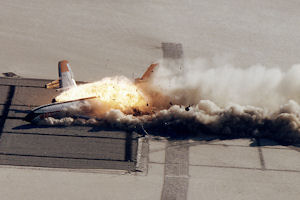 The interim Inspector General’s audit of the Metropolitan Washington Airports Authority, issued earlier this year, was scathing, documenting the abuses of a runaway board of directors. The final report, issued yesterday, is even more devastating. You know it’s bad when the title of the report — “MWAA’s Weak Policies and Procedures Have Led to Questionable Procurement Practices, Mismanagement, and a Lack of Overall Accountabilty” — reads like a yellow journalism newspaper headline.
The interim Inspector General’s audit of the Metropolitan Washington Airports Authority, issued earlier this year, was scathing, documenting the abuses of a runaway board of directors. The final report, issued yesterday, is even more devastating. You know it’s bad when the title of the report — “MWAA’s Weak Policies and Procedures Have Led to Questionable Procurement Practices, Mismanagement, and a Lack of Overall Accountabilty” — reads like a yellow journalism newspaper headline.
The report, prepared by the U.S. Transportation Department’s Office of Inspector General, documents that the abuses permeated the organization’s management as well, especially in the areas of hiring practices and procurement. Call it trickle-down corruption. Key conclusions:
- First, MWAA’s contracting policies and practices are insufficient to ensure compliance with the Airports Act and the lease agreement between DOT and MWAA. The Act and the agreement require the authority to competitively award contracts over $200,000 to the maximum extent practicable. However, for the period we reviewed, MWAA used categorical exceptions to limit competition for almost two-thirds of MWAA’s contracts that exceeded $200,000. … These weaknesses are exacerbated by ineffective contract management and oversight and a lack of adequate procurement integrity policies to ensure impartiality when awarding and administering contracts. …
- The code of ethics and related MWAA policies and procedures in place at the time of our audit lacked the rigor needed to ensure credibility and the integrity of management and employee decisions. … The Authority’s existing ethics-related procedures have been insufficient to detect violations of anti-nepotism and gift provisions and to identify potential conflicts of interest. For example, the Vice President of Human Resources indirectly supervised relatives, despite the code’s explicit provision prohibiting such relationships. In addition, employees regularly accepted inappropriate gifts from an MWAA contract — including Super Bowl tickets, travel, and accommodations worth almost $5,000. …
- MWAA’s hiring and compensation practices lack oversight and accountability. MWAA’s standard hiring process for filling vacancies or creating new positions has not been formally documented as an official policy, which has allowed senior officials to place candidates into new or existing positions without job descriptions, competition, or completed background checks. In some cases, senior officials abused MWAA’s student program to hire employees who were not students, using personnel documentation that falsely showed student status. MWAA’s lack of oversight also resulted in employees with known criminal convictions working at the Authority in sensitive and management positions for more than a year. In addition, MWAA managers awarded excessive salaries, unjustified hiring bonuses, questionable cash awards, and ineligible benefits. …
- MWAA’s policies and processes have not ensured accountability and transparency for activities conducted by its Board of Directors. … Without such controls, MWAA has not been able to hold its Board accountable to the same standards it holds its employees. Specifically, MWAA could not ensure that relatives and friends of Board members did not receive preferential treatment in hiring or contract.
Response from Board Chairman Michael Curto: “We take all the issues and concerns cited in the report very seriously and will respond to all of the report’s recommendations. We are examining today’s report with a particular focus on items that were not discussed in the Interim Report.”
Response from Governor Bob McDonnell: “Unfortunately, actions on the part of certain members of the MWAA Board of Directors, a general lack of transparency and accountability, and employee misconduct have jeopardized the public’s confidence in the Authority’s ability to ethically manage its critical assets and complete the Dulles Rail Project. The concerns that I have expressed over the past two years are, unfortunately, validated by the US DOT Inspector General.”
The governor said that he hopes that the seating of five new Virginia board members by November will “usher in a new era of leadership and governance.”
Time for follow up. Having turned up so many issues in its inspection of MWAA, the Inspector General’s office would be well advised to turn its attention to that other unaccountable interstate compact in the region, the Washington Metropolitan Area Transit Authority (WMATA). As documented by a recent Washington Times series, WMATA’s management deficiencies are even more manifestly evident than MWAA’s. Perhaps Rep. Frank Wolf, R-10th, the impetus behind the IG report, could push a bill through Congress requiring the Department of Transportation to take a look at WMATA as well.
— JAB


